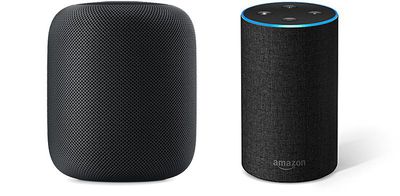HomePod shipments totaled 1.6 million units in the fourth quarter of 2018, a 45 percent increase on a year-over-year basis, according to Strategy Analytics. Despite the growth, the research firm estimates that Apple's share of the worldwide smart speaker market was just 4.1 percent during the quarter.

By comparison, Amazon and Google commanded the market with an estimated 13.7 million and 11.5 million smart speakers shipments respectively. The two companies combined for an estimated 65.5 percent market share in the quarter.

A lot of this comes down to pricing. At $349, the HomePod is significantly more expensive than the Amazon Echo and Google Home. In particular, the smaller Amazon Echo Dot and Google Home Mini models were available for as low as $25 during the holiday season, a fraction of the cost of a HomePod.
"Amazon and Google both have broad model lineups, ranging from basic to high-end, with even more variants from Amazon. Apple of course has only its premium-priced HomePod, and likely won't gain significant share until it offers an entry-level product closer to Echo Dot and Home mini," CIRP co-founder Josh Lowitz said last month.
To improve sales, many resellers offered the HomePod for $249 during the holiday season, and $279 is a commonly seen price too.
Second is the fact that the HomePod is not so smart, as many reviews found, due to Siri's shortcomings compared to Amazon Alexa and Google Assistant. Apple recently restructured its Siri team as it works to make improvements.
A third reason is availability. Apple launched the HomePod two to three years after its largest competitors, and sales remain limited to the United States, United Kingdom, Australia, Canada, France, Germany, Spain, Mexico, China, and Hong Kong. Amazon and Google smart speakers are available in more countries.
Last year, analyst Ming-Chi Kuo said Apple was "mulling" a "low-cost version" of the HomePod, potentially due to shipments falling "far below market expectations." It could end up being a Siri-enabled Beats speaker.
Of course, the Strategy Analytics data is estimated to begin with. Apple does not disclose HomePod sales, instead grouping the speaker under its "Wearables, Home, and Accessories" category in its earnings reports alongside the Apple Watch, Apple TV, AirPods, Beats, iPod touch, and other accessories.
























